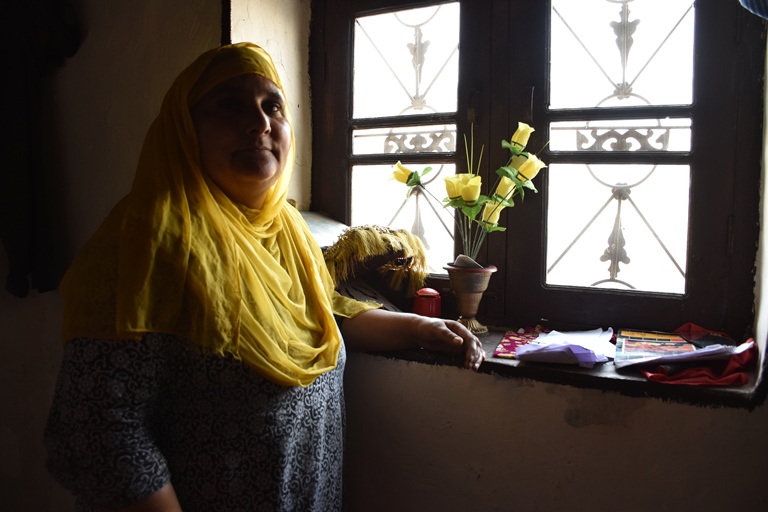PALHALAN, Indian-administered Kashmir – Shameema Jan, 48, peers out of a small window to see what is causing the commotion outside her home in Palhalan village, 20 miles north of Kashmir’s capital, Srinagar. It’s a group of young men, swarming and filled with with rage, gripping stones in their hands and shouting slogans against Indian rule, calling for freedom.
“Adil!” she yells.
Jan’s son, Adil Ahmed, 22, is trying to sneak out of his room to join the street protest. His mother grabs his arms and pulls him back inside.
“I can’t bear another tragedy!,” she screams at him. “I am already broken.”
Ever since her husband was killed by the Indian army in 1999, Jan has struggled to keep her only son away from the deadly political turmoil in Kashmir, the Muslim-majority territory divided between India and Pakistan and claimed by both. Like thousands of Kashmiri women whose militant husbands have died in the 30-year counterinsurgency campaign, Jan was left with little education, no means of supporting her family and no help from the government or her community. And like many of those widows, Jan also finds herself having to constantly fight to stop her son from meeting his father’s fate.
“It becomes difficult to hold him back in situations like these,” Jan says, referring to the latest uprising, sparked when Kashmiri rebel commander Burhan Wani was killed by Indian armed forces in a shootout in July. “Like other young men [who protest the Indian rule], he also wants to go out. But how can I let him go? He is my only hope.”
Jan’s struggle for survival began in the early 1990s, when her husband, Muhammad Ramzaan Malik, voluntarily crossed over to the other side of the Line of Control into Pakistan to receive arms training and fight for Kashmir’s independence. When he died, Jan and Ahmed joined the list of over 129,600 Kashmiri widows and orphans created since 1990, according to late sociologist Bashir Ahmad Dabla in his book “Widows and Orphans in Kashmir.” Families like Jan’s, where the head of the household has been killed in the clashes, are an “extremely suffering” population in present-day Kashmir, writes Dabla. Mothers and children face depression, lack of education, dire economic conditions and health deterioration.
“We’ve been living on the edge,” says Jan, rummaging through old photos of her husband.
For her, all hopes for the family’s future rely on her son. She wants him to pursue higher education and become a professor. The struggle for education is, in part, aimed at regaining the family’s social status now that the community has “turned their back on us,” says Jan. When Malik was killed, friends and neighbors sang azaadi (freedom) songs and applauded Jan for her husband’s “martyrdom.” But soon after, Jan, her son and her two daughters were abandoned by those same people, she says.
“When a militant is ‘martyred’ in Kashmir, people in their thousands attend his funeral and salute his martyrdom,” says Abdul Qadeer, who runs the People’s Rights Movement, an organization of former local militants. “But when time passes, the same people forget and ignore his family.”
Qadeer would like to see communities creating small local groups dedicated to supporting the families of militants who have died, especially to keep the children in school. Some regional orphanages will take in the children of widows until they complete their schooling, and even offer scholarships. But with no support from her community and not wanting to send her children away, Jan approached various groups for help, including her local government officials and Jamaat-i-Islami, the politico-religious parent organization of the Kashmir-based Hizbul Mujahideen militant outfit. But she got none.
“I have lost hope in pro-freedom groups as well as the government,” she says. “Our children are traumatized. They have only seen hopelessness, and we yearn for their better future.”

With little to no education, Kashmir’s militant widows often turn to manual labor to make ends meet. Jan, who has lost sight in her left eye, now works as domestic help. But even as she struggles to make enough money to feed her family, “My only concern has been to keep my child safe,” she says.
Like so many other mothers in the village left to take care of their families on their own, Jan becomes anxious every time a protest takes place or rebels and government forces clash. Ahmed is frequently harassed by Indian authorities due to his father’s background, says Jan, so she is “forced to confine him to his room until the peace returns.”
But there’s no knowing when that will be. “It was never easy to breathe as a militant’s wife, and now as a militant widow,” Jan says. “One just can’t breathe easily.”
This story was reported with the support of the International Women’s Media Foundation through the Howard G. Buffet Fund for Women Journalists.
